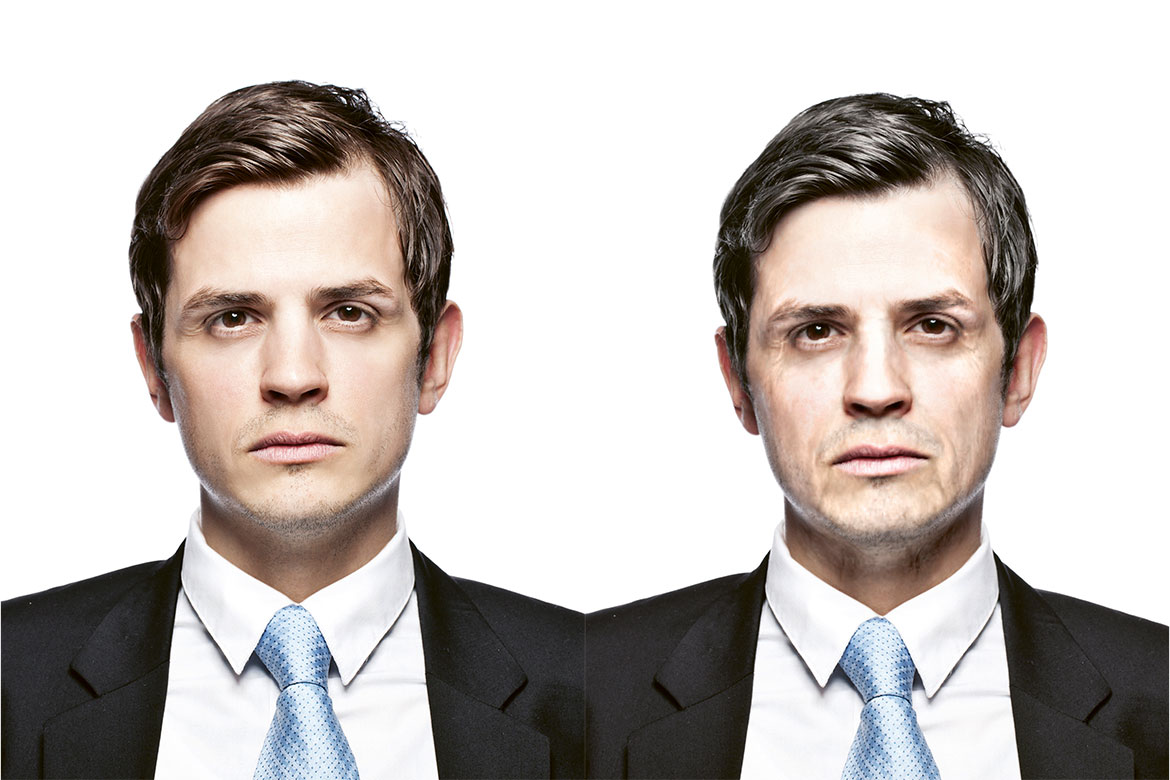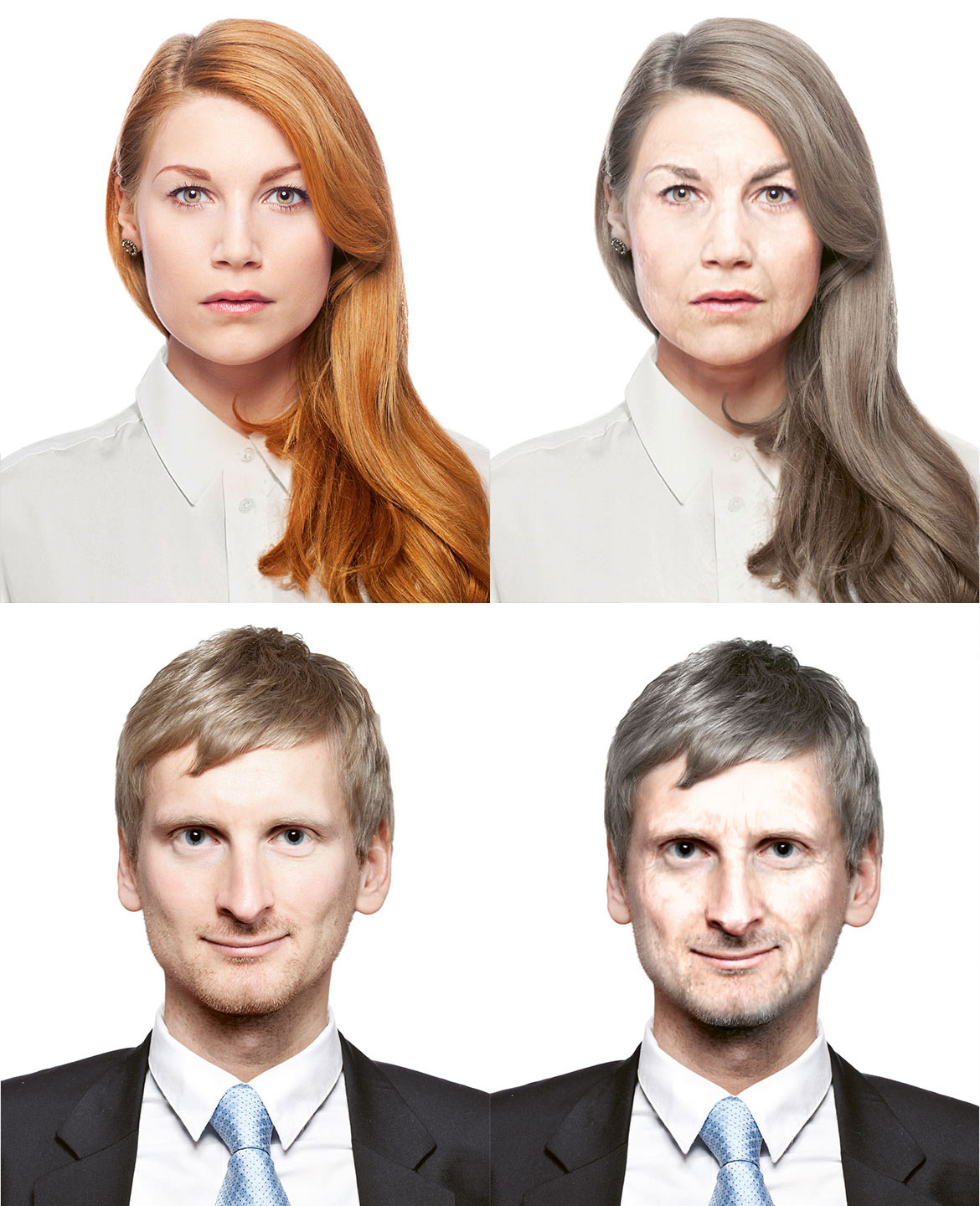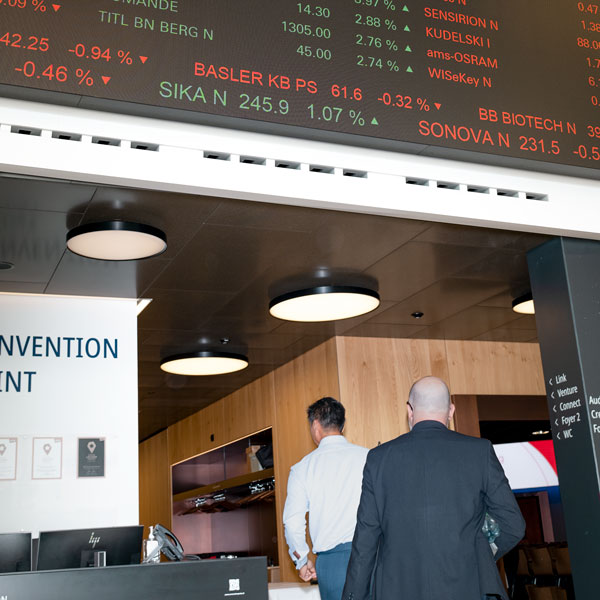Forever young?
Older jobseekers can score points on the market with their greater life and career experience – but only as long as they don’t come across as ‘old’. Researchers have now shown that age discrimination is underestimated in Switzerland.

We used six photographs (three men, three women) to manipulate facial age appearance. Specifically, we obtained photographs of three women and three men looking 30 years old from iStockphoto and morphed them with April Age to produce photos that looked roughly 50 years old, yielding a total of 12 photographs. | Image: Franciska Krings
If an applicant’s CV has a passport photo attached, your eyes are inevitably drawn to it. It’s just an initial impression – it’s not going to decide whether or not the applicant will be invited for an interview. Or so we’d like to think. But first impressions based on someone’s facial features have a deep impact on how we perceive and assess other people. In general, if we look older, this suggests a lack of fitness – both physical and cognitive. In a work environment, this can imply we are less able to master complex tasks, and slower to acquire new competencies.
In 2017 a research team from the universities of Bern, Lausanne and Brandeis in Waltham (USA) carried out a simulation of how these psychological mechanisms affect the job selection process. The participants in the study comprised a group of non-professionals and a group of HR experts. They were provided with CVs whose portrait photos had been manipulated to show the same candidates aged either 30 or 50. Stock photos from an agency were chosen of people who looked 30 years old. Using morphing software, the researchers created an image of each of them that looked 20 years older. The older-looking candidates were in all cases given lower ratings than those who looked younger. What’s more, this was independent of the actual age stated on their CV. Facial perception thus had a bigger impact than their real, chronological age.
Stressing your fitness can help
The age disadvantage was lessened when the researchers changed the CVs to include hobbies that could counter prejudice about a possible lack of physical or mental fitness – such as getting a high ranking in a marathon, or getting an award in a cooking competition.
“Jobseekers who are aware of their age disadvantage can get around it by listing competences on their CV that don’t fit the stereotypes associated with their age group”, explains Franciska Krings, an occupational psychologist and professor at the University of Lausanne. She was in charge of this study, which was funded by the SNSF. Krings observed a similar effect in another study on ‘impression management’ in job interviews. The age disadvantage can be similarly mitigated if applicants take an active stance in their job interview, countering negative prejudices and utilising tactical self-promotion.
“Such strategies can be helpful, but they merely combat the symptoms”, admits Krings. It’s really down to employers to organise fair procedures. They could offer appropriate training programmes for their recruiters, or standardise selection processes. In Krings’ opinion, photos should be eliminated from application processes – at least at the interview selection phase. “It would be good if the first glance at an applicant’s CV were to exclude a photo”. Krings has meanwhile engaged in field research on the professional network LinkedIn, and this confirmed the impact of age discrimination through facial perception. Even if older jobseekers present themselves skilfully, they get fewer job offers than younger applicants – unless they upload a photo that makes them look younger.

Image: Franciska Krings
Manpower sees no age disadvantage
Manpower Switzerland, one of the biggest recruitment agencies in the country, says that including a portrait photo on a CV is ‘optional’. “If applicants don’t have a suitable photo, then our recruiters advise them not to use one”, explains Manpower’s head of communication, Romain Hofer. In any case, the crucial question is: “Is the photo a suitable marketing tool to get a candidate invited for interview?” Depending on the job profile, it can actually be an advantage for a candidate to look older. “Looking older is associated with greater credibility and experience”. Besides professional competences, soft skills are getting more and more important on the job market: “Companies are looking for personalities”. As for the danger of age discrimination in the recruitment process, Hofer says that his company holds regular employee training sessions to try and prevent all kinds of discrimination.
It is common practice today to send off an application with a photo, says the Swiss Federal Personnel Office (FOPER). But adding a photo isn’t compulsory in their online application system. “We get applications without a photo from all age categories – and it’s not to the detriment of any applicants”, says the EPA. The federal government has binding guidelines that expressly confirm that recruitment takes place without discrimination. It says: “The recruiters commit themselves to these principles with their signature”. For example, if “comprehensive IT knowledge” were required for a job that in concrete terms does not need it, then this would count as indirect age discrimination. In 2018 over 10 percent of the appointments made by the federal government were of people over 50. And the federal authorities are “unaware of any discrimination complaints”.
Not much legal protection
Unlike most EU countries, age discrimination is not forbidden by law in Switzerland. Complaints are still possible, based on the equality guaranteed by the Federal Constitution, but they can only be lodged expressly against the State. No specific legal basis exists for any such complaints in the private sector. “That’s the real problem”, says Christa Tobler, a professor of European law at the University of Basel. When it comes to discrimination for reasons of age, she says Switzerland “clearly has a lot of catching up to do” when compared to other countries.
Tobler here refers to a report issued by the Organisation for Economic Cooperation and Development (OECD) from 2014, according to which Switzerland is below the average for OECD countries when it comes to appointing people over the age of 55 years. The OECD has long been campaigning for a comprehensive strategy to fight age discrimination in Switzerland. Tobler has launched a research project to show what concrete measures Switzerland could take in its employment and social security laws. Her project also investigates possible protection measures for especially disadvantaged groups, such as older women. The results should be ready by late 2022.
Tobler had long been keen to get to grips with the topic, but she initially came up against opposition to her idea. “People told me it was exaggerated to speak of age discrimination in Switzerland”. But the importance of the topic has now been generally recognised, she says.
Franciska Krings would also like to see people become more aware of the problem. Often, someone’s age is used as an exclusionary criterion without anyone even thinking properly about its relevance to their performance. “It’s been scientifically proven that people’s work performance does not diminish with increasing age”.




